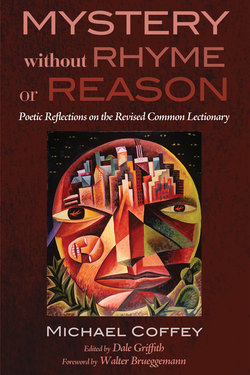Читать книгу Mystery Without Rhyme or Reason - Michael Coffey - Страница 5
На сайте Литреса книга снята с продажи.
Foreword
ОглавлениеI have not read anything in a very long time that so amused me, astonished me, convicted me and satisfied me. I had such an experience in reading Michael Coffey’s compelling words that I had to find (for me) a new word to characterize it. The word is “quotidian”! It means simply “commonplace, ordinary, routine.” That is what his work is: quotidian! It speaks of the concrete, the specific, the most specific, the stuff right in front of us. We hear about food and sleep and bathrobes and grasshoppers and breakfast, the daily stuff that constitutes our life.
For that reason, this poetic exposition should be familiar and commonplace. But of course it is anything but that because Michael has mobilized his pastoral imagination and has transposed ordinary and familiar texts into disclosures that are indeed revelatory. The result is that every text on which he comments takes on a fresh dimension, and a new angle about which I had not thought before. There are those among us who think that the faith attested in the Bible is too old-fashioned, too predictable, too rigorous, or too out of touch to grab attention in a world of rush. But Michael shows otherwise in his words that violate all of our preconceptions in showing us the surprise that awaits us in the text.
At work here is the daring sensibility of a poet who twists and turns us to a new angle. But also at work here is a pastoral theologian who is so well grounded in the tradition that he can explore and probe with ease and with confidence. While so much conventional faith is busy restricting, confining, and limiting, Michael keeps offering new vistas for us and drawing us out beyond where we are. When the lines end, the world is different and the earth has moved under our feet.
My favorite is God’s “bathrobe,” a riff on the divine “train” that follows God’s holiness in the temple vision of Isaiah 6 that frills the entire space. That “train” (now read as “bathrobe”), by the time Michael finishes, fills the entire earth and puts down holy presence here and there well beyond the temple, Michael leads us to wonder why God has on a bathrobe. Perhaps it is Sabbath for coziness for God. Perhaps God had just been through the chaotic waters that were tamed for a bath. Perhaps God is wanting to decode and demystify the high liturgy of the temple, making it less formal and more accessible. I do not know why and Michael does not tell us why. But I do know that I will never read the text of the temple vision with its three-times “holy” the same way again. Nor will the earth ever be the same again, because it is now seen to be God-occupied; the evidence of the divine bathrobe is everywhere, once the poet shows us how to look.
Michael refuses to let us know for sure what the text might mean; he gives us probes, not arguments or explanations or conclusions. The text, in his hands, will not sit still long enough to have “one meaning.” His words are not unlike Pentecost. Indeed it is Pentecost every time . . . many tongues, many images, many possibilities that set us off in new freedom. We may be grateful for the tongues in which Michael speaks and writes. This is indeed practical theology as a great form of art. It refuses to dispel the mystery; rather it works to enhance and deepen the mystery of divine presence and purpose by showing us that in the mundane and the quotidian the reality of God comes “bodied” in ways we can handle and parse. When we finish one of his daring testimonies, we need time to linger and reflect and receive. We are surprised at a cognitive level. But in an affective way we are transformed. The Fourth Gospel concludes, “These things are written in order that you may believe . . .” (John 20:31). Surely that is why Michael has taken such great care to get it right. He writes his poetic abundance in order to generate faith, that is, “that we may believe.” But the believing to which he invites us is not conventional. He rather hopes that faith will come alive among us in daring, irreverent, impish ways, that the world may be kept open for the coming of Messiah. The cunning with which Michael addresses us corresponds to the cunning of the Gospel narratives themselves. We have learned all too well to flatten out that gospel cunning by dogma and by criticism in order to make it manageable. Michael refuses that and invites us to refuse as well. The alternative to “managing” is hosting and nurturing the words as they work on us. The world around is now mostly explained, controlled, and managed. But it does not give life. What will give life is the word that opens and astonishes and heals. That sort of word is what Michael utters here, for which we may be attentively grateful.
Walter Brueggemann
March 4, 2015, Columbia Theological Seminary
